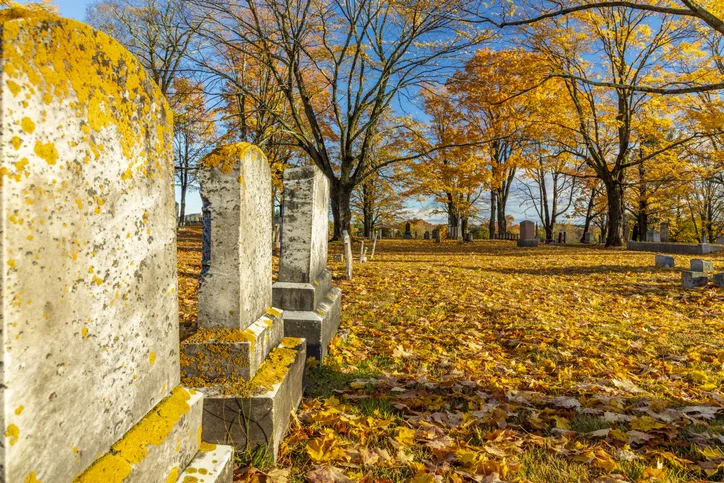
A cemetery in Dover by Thomas H. Mitchell/Getty
So much history of everyday women who have contributed to the Granite State is buried. But New Hampshire author and historian, Glenn Knoblock, will help to uncover those stories when he gives his talk, “Granite Women: The Hidden Lives of NH Women as Seen in the Cemetery, 1674-1992,” – based on his 2021 book of the same name. The lecture will be held at the Nashua Historical Society, on Saturday, March 19 at 7 p.m.
Knoblock will discuss how headstones, in small burial grounds and cemeteries throughout the state, hold clues to the lives of hard-working women, whom time might have forgotten. Those graves date from colonial New Hampshire through the 20th century. They represent women who were from diverse ethnic and socio-economic backgrounds including craftswomen, teachers, war heroes, and millworkers.
Knoblock, part of the New Hampshire Humanities speakers bureau, knows his cemeteries. Some of the over 20 history books he’s written are about New England burial grounds.
In the introduction to his book, Knoblock wrote that for most of its history New Hampshire, like the rest of the country was a male-dominated society where “the voice of women from the past were often “overshadowed, overlooked or ignored altogether.” And while some of those stories can be found in documents and books, still others can be discovered in the state’s burial grounds.
The author’s research features over 40 graves in New Hampshire, a few, like teacher astronaut Christa McAuliffe, buried in Concord’s Cavalry Cemetery, are well known. But mostly these women have either never been known or have been lost to history
For example, Knoblock talks about the grave of Esther Whipple Mullineaux, born in Portsmouth in 1784, died in 1868, and is buried in the city’s North Cemetery. She was the daughter of two former slaves. Her father, Prince Whipple, was a soldier, and a bodyguard during the American Revolution under his slaveowner and Declaration of Independence signer General William Whipple. Her mother, Dinah Whipple, was born into slavery at the home of her enslaver Rev. Stephen Chase of Newcastle, and became a free woman at age 21. She was a leader in Portsmouth’s free Black community and created the state’s first school for Black children in 1806. The Dinah Whipple STEAM Academy at the University of New Hampshire is named in her honor. Mullineaux married three times, had five children, and worked enough hours as a laundress to buy her own home. Knoblock writes, that there are few marked burial sites for the state’s earliest free-born African Americans. Mullineaux’s “weather-worn gravestone” not only marks her final resting place but also “serves as a reminder of the evolution of race relations in New Hampshire from colonial times to the end of the Civil War.” She lies in rest near her father and General Whipple. It’s believed her mother is buried there too, but there is no headstone to mark her grave. Mullineaux left her estate to the North Church in Portsmouth, where she was a dedicated and lifelong parishioner.
Knoblock also wrote a section of his book, on the headstones of New Hampshire women who died tragically. Among them is the grave marker of Josie A. Langmaid, who was a 17-year-old student at Pembroke Academy in 1875 when she was reported missing from school one October day and was found later day in a swamp – headless – her clothes torn and bloody. Her head was found the next day, according to Knoblock, “her face battered and beaten.” Canadian-born Joseph LaPage, who was later nicknamed “The French Monster,” was convicted of the teen’s murder and suspected of similar crimes. He was and hanged in Concord in 1878. Langmaid’s body was buried in Pembroke’s Buck Street Cemetery and a monument was installed by the residents of Pembroke in the spot where she was found and inscribed with the grisly details of her murder.
Knoblock’s talk at the Nashua Historical Society is free and open to the public.

Where to find the best waterfall hikes in New Hampshire
The Granite State is a hiker’s paradise. Here’s where to find the best waterfall hikes in New Hampshire. One of the best things about living in New...

8 top things to do in NH this weekend
From mountaintop hikes to seaside fairs, live concerts to fairy festivals, there’s no shortage of ways to get outside this weekend. Here are the...

Things to do in NH this weekend
Looking for something to do this weekend? From riverside festivals to vintage toy hunts and Broadway-style musicals, here are some of the top events...

New Hampshire fair & festival guide for summer 2025
For over 300 years, New Hampshire has been home to summer fairs. Here’s a guide to this year’s celebration of local culture, agriculture, and pure...

8 wonderful waterfall hikes in New Hampshire
Do go chasing waterfalls this summer. Discover eight hikes in New Hampshire with beautiful waterfalls, scenic views, and options for every skill...

Glamping, Airbnbs, & inns perfect for a NH staycation
Make this summer a memorable one without the hassle of traveling too far from home. Book a local NH staycation! What emerged as a prominent global...





